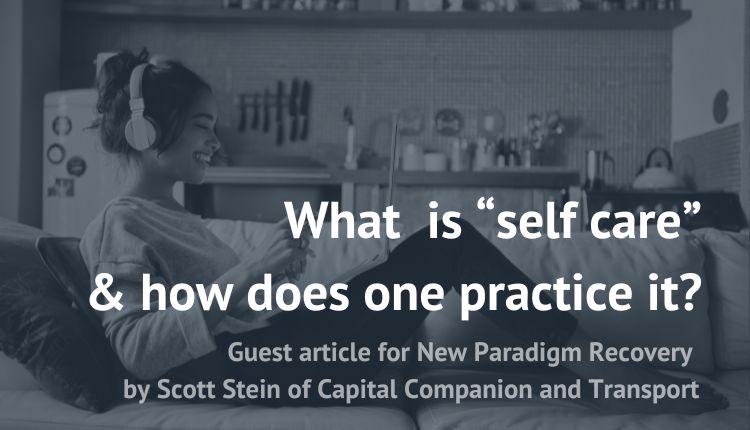A Guest Article by Scott Stein of Capital Companion & Transport
The concept of self-care has been used by the medical community for a long time in reference to promoting or maintaining health and acknowledging individuals as active managers of their well-being. However, the term self-care has evolved over the decades to encompass a wider array of practices and meanings across communities. For example, the term was embraced during the civil rights era and feminist movements of the 1960s-70s as a political statement, asserting a person’s autonomy over their personal health. Recently, and in part spurred by the Covid-19 pandemic, the term has grown in popularity alongside a booming self-care market related to activities that address mental health. With that being said, the trendiness of the term doesn’t take away from the importance of engaging in activities that improve one’s health and well-being.
Finding Balance
Practicing self-care is important when working high-stress jobs or long hours. It’s essential to find ways to unwind and recharge. Self-nourishment is not about boosting productivity but rather finding ways to have a healthy work-life balance. Potential activities include:
- Quick stress-reducing exercises such as deep breathing or stretching. There are even resources available to guide you through an exercise while sitting in your office chair.
- Time-blocking for self-care activities such as going on a walk or journaling to give you the space to focus on personal well-being.
- Boundary setting with work and technology. For instance, there are websites and tools that help limit distracting websites or social media. These tools are not only helpful for adults but can also help teens and children who are still building time management skills.
Importance in Addiction Recovery
Self-care is also very important in the early recovery process for people experiencing substance use disorder (SUD) to help reconnect with oneself as well as the community around them. During this sensitive period, self-care activities may help sobriety and overall well-being. Self-care activities for people in early recovery may include:
- Mindfulness and meditation practices to help manage stress. Mindfulness looks different to everyone and meditation may seem daunting at first. But, there are many resources available that make the practice easy to try, like this quick three-minute guided meditation video.
- Creative expression and journaling allows individuals to explore their thoughts and feelings in a constructive and therapeutic way. For example, you could set aside a certain amount of time each day/week for art or following a 30-day journaling challenge.
- Building a sober support network. By participating in supportive networks individuals can share experiences and receive support from others who are on a similar journey.
Self-Care for Families and Support Networks
Additionally, self-care is important for families and friends of people experiencing mental health issues, SUD, or other struggles. It’s hard to be a support system when your own health and well-being are struggling. In addition to the tools already discussed, self-care may look like:
- Setting boundaries. This may be easier said than done, but establishing and commuting boundaries with loved ones can help maintain healthy relationships.
- Prioritizing one’s own needs and emotional well-being like engaging in hobbies or exercise to help with emotional strength.
- Seeking support groups and therapy. Connecting with others who share similar experiences can provide a sense of belonging and validation. If you’re looking for a more individualized care approach, professional therapy offers a safe space to process emotions.
Self-care is an important part of one’s health journey, and everyone should practice self-care in their own way. Further, nurturing oneself enables us to support and offer encouragement to our loved ones. We encourage you to make a promise to yourself to prioritize your own self-care. A good place to start could be exploring one of the strategies discussed above.
At CC&T, our mission is to provide unwavering support to individuals facing the challenges of substance use or mental health disorders, along with their families and care partners. We specialize in one-on-one peer support and collaborative consultations, where we carefully assess each person’s unique needs to chart a personalized path forward.
Connect with us to find out more!
About the Author

For more about self-care, check out a recent post by New Paradigm Recovery Medical Director, Anu Mathew about the best self-care resources.

